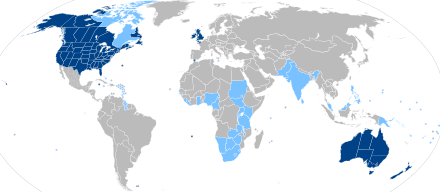Curso de inglés básico

El inglés es una lengua germánica y una de las lenguas más extendidas por todo el mundo se habla en Reino Unido, Estados Unidos, Canadá, Australia, Nueva Zelanda y muchos países de África, además junto con el francés es una de las lenguas oficiales de la O.N.U. y la U.E.
Los días de la semana
[editar]The days of the week:
Pronombres
[editar]Personal pronouns (Personales):
Object pronouns (Posesivos):
Los meses del año
[editar]The months of the year:
Frases cordiales
[editar]
- Please Por favor
- Thanks Gracias
- Thank you Te agradezco
- I'm sorry Lo siento
- Excuse me Disculpa
- You're welcome De nada
Saludos
[editar]
Saludos más comunes en inglés.
Cuando nos encontramos con alguien conocido:
- Hi
- Hello
Diàlogo:
- A:How are you?
- B:Fine, thanks. And how are you?
- A:Very well, thank you./ Fine, just fine.
- What are you doing? (el diálogo continúa en forma similar al anterior)
- How are you getting on? (ídem)
Por la mañana:
- Good morning
Por la tarde antes de las 17hs:
- Good afternoon
Por la tarde luego de las 17hs:
- Good evening
Cuando nos vamos a dormir:
- Good night
Cuando nos despedimos de alguien:
- Bye! (registro informal)
- Goodbye
- See you later
- Cheerio (uso muy británico)
- Cheers! (También usado en los brindis, el equivalente del español 'Salud!. En las últimas décadas los británicos comenzaron a usarlo para despedirse también)
- Bye! Have a good trip! (cuando nos despedimos de alguien que se va de viaje).
Los números
[editar]The cardinal numbers (Cardinales)
- 200 Two hundred
- 1000 One thousand
- 2000 Two thousand
- 10000 Ten thousand
- 100000 One hundred thousand
- 1000000 One million
- 1000000000 One Billion
- En inglés el billón corresponde a la cantidad de mil millones, lo que en español corresponde a millardo, mientras que billón es un millón de millones
The ordinal numbers (Ordinales)
Preguntas útiles
[editar]
Expresiones que te pueden ayudar.
- Why? (Cuando queremos saber la razòn o el motivo de algo).
Example: A: Why is the bank closed? B: Because it's Sunday!
Como respuesta a una pregunta con 'Why...?', usamos 'Because....? así como en español usamos '¿Por qué...? y para responder 'Porque...'.
- Who? (Cuando preguntamos por la identidad de una persona).
Example: A: Who's that? B: That's my brother.
- How? (Cuando preguntamos por el estado de algo o alguien).
Example: A: How are your sister? B: Is fine.
- What?(Cuando preguntamos por la identidad de una cosa).
Example: A: What is this? B: That's my notebook.
- When?(Cuando preguntamos sobre el tiempo).
Example: A: When do you worked? B: I worked at night.
- Where?(Cuando preguntamos sobre el lugar).
Example: A: Where I am? B: You are in USA.
- Which?(Cuando preguntamos por un objeto).
Example: A: Which's that? B: That's my brother's book.
- Can you help me?
- May I help you?
- What's your name?
- How much is this?
- How far is this?
- How long? ( Lo utilizamos para preguntar cuánto tiempo se lleva realizando una acción)
- How often? ( Lo utilizamos para preguntar con qué frecuencia se realiza una acción)
- En inglés el signo interrogativo (?) se usa solo al final
Tiempos Verbales
[editar]
Principalmente son estos los tiempos verbales más comunes en inglés aunque pueden existir otros.
| Time | Simple | Continuous | Perfect |
|---|---|---|---|
| Present | The bank closes | The bank is closing | The bank has closed |
| Past | The bank closed | The bank was closing | The bank had closed |
| Future | The bank will close | The bank will be closing | The bank will have closed |
Voz Pasiva
[editar]
Se trata de oraciones donde la acción recae en un objeto y no en un sujeto la fórmula es muy simple:
- Object + verb to be + past participle
- I paint the house (Active)
- The house is painted by me. (Pasive)
Algo muy importante es verificar que el verbo to be use el mismo tiempo verbal que en el activo.
- Object + verb to be + past participle
- I am painting the house (Active)
- The house is being painted by me. (Pasive)
Causativos: Se trata de oraciones donde la persona no realiza la acción directamente pero la hace alguien más, la fórmula es muy simple:
- Subject + get/have + Object + verb in past participle
- My father get/has his car cleaned
Deseos
[editar]Se trata de oraciones donde la persona desea expresar un deseo, en este caso particular el tiempo cambia. Las expresiones típicas son I wish o If only
- Present situation -> wish/If only + Past
- I wish/If only I had my umbrella
- Past situation -> wish/If only + Past Perfect
- I wish/If only I had taken my umbrella.
Si deseamos algo para alguien más entonces la estructura sería:
- Present situation -> wish/If only + Someone or Something + would + verb
- I wish/If only it would not rain.
En la forma negativa sería un remordimiento.



